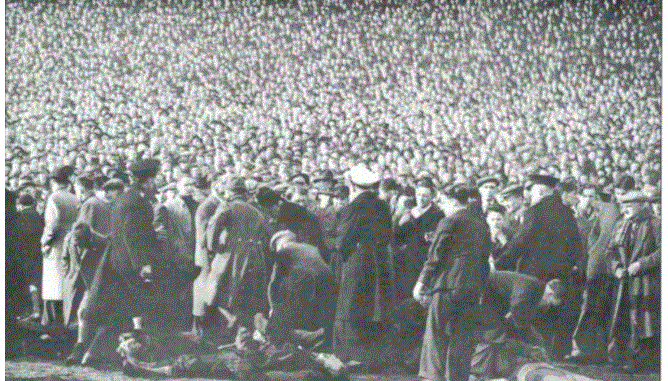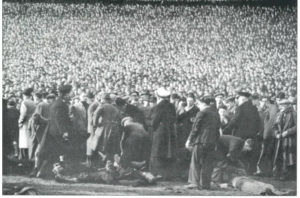
Remembering the Burnden Park Disaster and the 33 killed in ‘football’s forgotten tragedy’
33 people went to a football match on this day in 1946 and never came home
It was the most tragic day in British football history at the time and the saddest day in Bolton Wanderers’ history.
Thirty-three persons attended a football game on March 9, 1946, and never returned home. Thousands of people
who were present will never forget what they saw and experienced, and hundreds more were hurt.
Yet, the Burnden Park Disaster is one that is rarely talked about outside of Bolton and has become known by some as
‘football’s forgotten tragedy’.
Bolton Wanderers was playing Stoke City in the second leg of the FA Cup quarterfinal after winning the first leg 2-0.
People travelled from far and wide to see the game because of the competition’s prominence at the time, the
appearance of stars like Stanley Matthews, and the fact that it was the first FA Cup after World War II.
 The match was officially attended by 65,419 people, however Burnden Park could accommodate 70,000 people. The
The match was officially attended by 65,419 people, however Burnden Park could accommodate 70,000 people. The
turnstiles were shut down 20 minutes prior to kickoff at 2.40 pm due to the steadily increasing throng.
Even more people were able to get in by jumping over the blocked turnstiles, entering from the railway, and entering
via a locked gate that was opened to let out a father and son who were unable to handle the mob. It is anticipated
that approximately 85,000 fans were able to swarm to the event.
When referee George Dutton saw spectators from the railway end terrace overflowing onto the field, the game was
stopped after twelve minutes. Police also told him that two fences had fallen under the weight of the supporters,
resulting in a crushing fatality.
After a half-hour delay, on police advice Mr Dutton decided to continue and finish the game, despite some corpses
still being at the side of the pitch. People as young as 14 and as old as 67 were among those who lost their lives – with
the original death toll being reported in the press as 38, before the total of 33 was confirmed.
Bolton Wanderers’ secretary and club historian Simon Marland sympathises with the police and referee’s
predicament and the choice made.
“Most of that crowd had no idea what had happened and were completely unaware that people had died,” he
claimed.
Since there would have been a complete free-for-all, I can well appreciate the police’s reasoning.
The nation was rocked by the tragedy, and the Sunday Mirror (then called the Sunday Pictorial) led the nation the
next day with the story on the top page.
In the article, headlined: ‘The most horrible game ever played: 38 killed at a cup tie – and they went on playing
football’, the vicar of Bolton, Canon W. J. H. Davidson spoke of his disgust at the game being allowed to continue.
He told the Sunday Pictorial: “I am horrified that the game should have continued subsequently, even though I am
not fully aware of the situation.
“I would like to know why, and I can only denounce such a choice unless there was a compelling cause.
“The human thing to have done would have been to stop the game and send the people home.”
Alderman W. Bradley, the deputy mayor of Bolton, disagreed and accepted the referee’s ruling.
“I believe there would have been a riot if the match had been stopped because so many spectators would not have
known what had happened,” he stated. That may sound callous, but that’s how I felt during the game.
Read more news on https://sportupdates.co.uk/

Leave a Reply